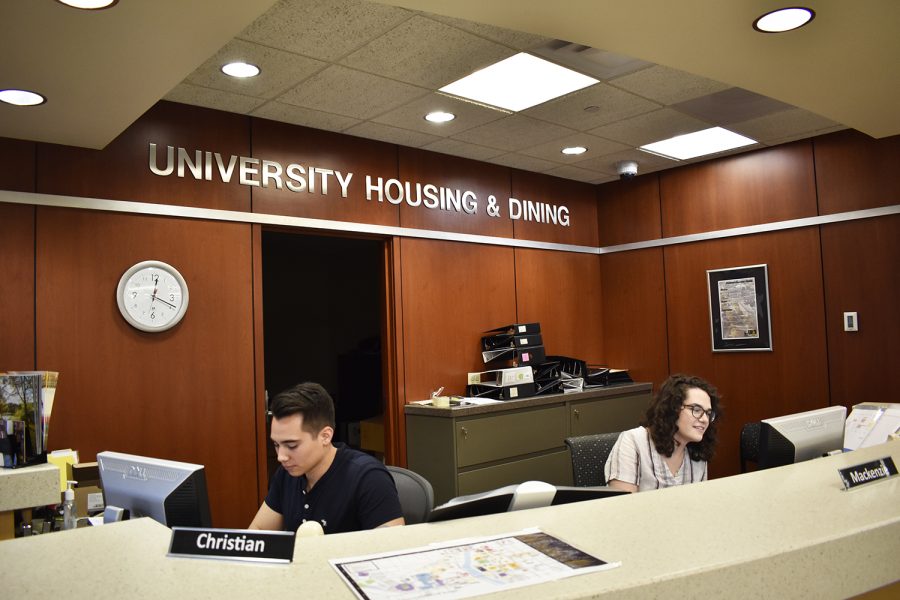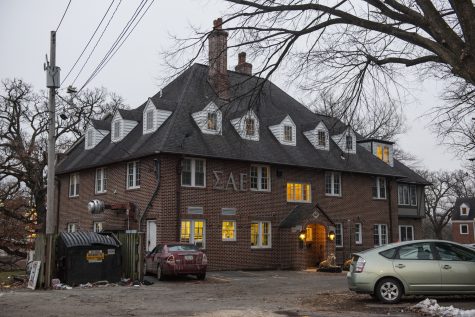Housing and Dining discusses results from resident-satisfaction survey
In its satisfaction survey, distributed every two years, UI Housing & Dining saw large increases in dining satisfaction, as well as LLC and roommate satisfaction.
Receptionists Christian Castano and Mackenzie Goss are seen at the University Housing and Dining Administration Building on Tuesday, August 28, 2018. University Housing and Dining are in process of making changes in their Residence Education Model.
April 16, 2019
On-campus residents were given the opportunity to voice their opinions on a number of housing and dining issues in the fall 2018 resident-satisfaction survey.
The survey asked students questions about their satisfaction with dining, residence halls, campus safety, among other items. The survey is distributed to all on-campus residents every two years, gauging their feedback and satisfaction.
Von Stange, the UI assistant vice president for Housing & Dining, said the overall results of the survey, which was taken by 2,104 students, were positive.
“The major feedback we got was that we’re doing things pretty well,” he said.

Scores went up in all areas but one, Stange said. The only area that had a decrease was residents’ perception of safety on campus outside the residence halls.
One of the areas that increased dramatically in the survey was student satisfaction with resident assistants, Stange said. The survey asked nine questions about RA availability and support, among other things.
“All nine of those factors went up, and they’re actually all at historic levels,” Stange said.
One area that he said he wanted to improve more was the noise level in the residence halls. However, he said, Housing & Dining doesn’t have as much control over that as other factors.
“It’s an OK score,” he said. “But it’s an area where, if we look at all the questions and their means, it’s probably one of the lower scoring ones.”
The biggest increases compared to previous years were seen in dining, Living Learning Communities, and roommate satisfaction, Stange said. They all went up around a third of a point on a seven-point scale.
Changes in dining were made in response to the survey, Stange said. The dining-hall hours were extended to 8:30 p.m., and the hours that flex meals are offered at Clinton Street Market in Burge were extended.
Catlett resident Tavia Dreismeier said she was mostly satisfied with the dining experience and the variety and availability of flex meals. However, she said, she would like the Late Night Fire Up Grill in Catlett to offer flex meals.
“You’re not getting a flex meal for every meal,” Dreismeier said. “For someone who wants them for every meal, it’s probably not enough variety.”
Stange said a factor that contributed to the increase in LLC satisfaction score was a change in the 2017-18 school year to make LLCs optional.
From 2013 to 2017, LLCs were required for all first-year students, Amy Baumgartner, assistant director for residence education, said in an email to The Daily Iowan.
The decision to make LLCs optional came from residents showing little engagement in their LLCs, Stange said. Some students would choose to live in an LLC only because of the building it was in without much interest in the community.
“It watered down the experience for everybody,” Stange said.
Baumgartner said the current system, with smaller and more focused communities, works better to serve the interests of the students involved.
“We have LLCs where students are more engaged with each other and with the programming we are offering,” she said. “Not because they had to choose that option but because they wanted to.”



















